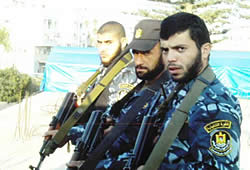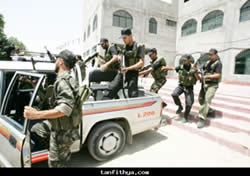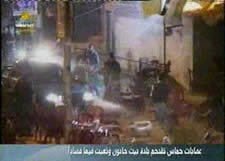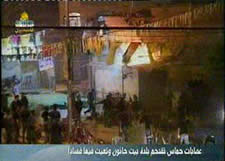
|

|
| Hamas's Executive Force, the movement's main enforcement arm. Its operatives also function as "morality" police to impose Islamic social codes on the population in the Gaza Strip. |
| THINK-ISRAEL |
| HOME | July-August 2007 Featured Stories | Background Information | News On The Web |
Since Hamas took over the Gaza Strip, it has intensified its activities to impose an Islamic social code. Hamas is careful not to represent it as a step toward establishing a radical Islamic state. The process is just beginning but indicates an increase in the Islamization of the Gaza Strip.

|

|
| Hamas's Executive Force, the movement's main enforcement arm. Its operatives also function as "morality" police to impose Islamic social codes on the population in the Gaza Strip. |
1. Following the Hamas takeover of mid-June 2007, the Gaza Strip has in effect become a radical Islamic political entity with the trappings of a sovereign state. It is ruled by Hamas, whose ideology is radical Islam and which it aspires to impose on the entire Palestinian populace.
2. During the takeover itself senior Hamas figures made statements supporting Islamic rule and victory over the infidels.[1] That caused not only Abu Mazen and Fatah to be apprehensive, but Egypt as well, which shares a common border with the Gaza Strip, is afraid radical Palestinian Islam will invade its territory.[2]
3. For the time being senior Hamas figures are careful to make it clear that they have no intention of establishing a radical Islamic entity in the Gaza Strip. They have even sent soothing messages to Egypt, stating that they do not mean to Islamize the Gaza Strip.[3] However, during the few months since the Hamas takeover it has increasingly imposed a compulsory radical Islamic life-style which influences the daily life and routine of all the residents of the Gaza Strip.
4. The process of Islamization is caused both by the steps taken by the Hamas government and the tendency of the local residents, both male and female, to adjust themselves to conform with Hamas' radical Islamic worldview. In addition, Hamas controls all social, welfare, educational, religious and media institutions,4] whose activities have a long-term effect on the nature of Gazan society.
5. The continuing Islamization of the Gaza Strip inhabitants, some of whom observe Islamic precepts in their daily lives, emphasizes the growing polarization between the Gaza Strip, controlled by Hamas, and Judea and Samaria, controlled by Abu Mazen and Fatah, whose orientation is national-secular.
6. Since the Hamas takeover the media have reported manifestations of Islamization in the Gaza Strip's daily life. Since Hamas controls the media, in our assessment the reports do not tell the whole story.
7. One of the most visible signs is the increasing number of bearded men. Gaza Strip residents who were interviewed said that they were growing beards for religious reasons and not out of vanity. Some of them said they were doing it because they were afraid of Hamas, whose operatives were detaining and interrogating everyone who looked secular (commentary by Suleiman al-Shafi, Israeli TV Channel 2, July 20, 2007).
8. The owner of a clothing store told a correspondent from alarabia.net that during the first days after the Hamas takeover he saw that many women had sought, clearly out of fear, stores where it veils could be bought. A female Al-Azhar University student said that no one had stopped her in the street in Gaza City to ask her why she was wearing western clothes and that no one had instructed her to cover her head. However, she added, she was still afraid that in the future Hamas would impose Islamic law since in its essence it was a religious Islamic movement (alarabia.net, June 28, 2007).
9. The Executive Force commander announced that a division had been set up for religious instruction and guidance in the prisons in the Gaza Strip, and that it was headed by an expert in Islamic religious law (sharia'). According to another report, the administration of Al-Saraya prison in Gaza announced that the sentences of all prisoners who learned five Qur'an sections by heart would be reduced by one year. A senior member of the prison administration said that a committee had been formed to supervise the issue. He said that many prisoners had responded to the idea of studying the Qur'an (Firas Website, August 6, 2007).
10. Felesteen printed an article about life in the Gaza prison run by Hamas' Executive Force. The warden noted that the prison administration was distributing copies of the Qur'an to every inmate and "organizing periodic lessons, sermons, spiritual guidance, correct Qur'an-reading instructions, the study of religious law, and much more..." He also said that the administration had promised that the sentences of all prisoners who learned five Qur'an sections by heart would be reduced by one year. One of the prisoners said that most of the time they prayed under the direction of sheikhs, "who direct workshops and give us additional lessons..." (Felesteen, August 29, 2007).
11. Ynet correspondent Ali Waked quoted a young Palestinian named
"Ahmad" who said: "Who would believe that once some of the guys
could organize a party with girls dancing in a hall, or even just
in the street. So help me, dancers in the streets of Gaza. It all
disappeared with the intifada and now it is inconceivable, it's a
dream. Once we would go to the Square of the Unknown Soldier to
watch girls who dared to wear tight pants and go with their heads
uncovered, but not any more..." (Ynet, August 15, 2007).
12. Hamas' Executive Force imposes Islamic social codes on the local populace of the Gaza Strip. Actions are carried out not according to secular law (where the legal system did exist in the Gaza Strip, it has been completely paralyzed) but according to Islamic religious law (sharia'). On July 22, Islam Shahawan, a spokesman for the Executive Force, announced that an Islamic legal committee had been formed to replace the district attorney's office because lawyers did not appear for work. The committee is headed by a Hamas member of the Palestinian Legislative Council, Marwan Abu Ras, who today serves as chairman of the Palestinian Scholars' League (an organization affiliated with Hamas which provides it with religious legal support).
13. Hamas asks clerics for their religious opinion regarding various governmental issues (a custom also observed before the movement took over the Gaza Strip). For example:
A. The Palestinian Scholars' League issued a Islamic religious edict (fatwa) stating that the health workers' strike in the Gaza Strip was not legal according to Islamic law (Pal-media and Palestine-info Websites, August 26).B. Marwan al-Ras called upon Ismail Haniya's government to oppose a dialogue with "those whose financial and administrational corruption has been proven."
C. Marwan al-Ras allowed homes to be searched and telephones to be bugged with some qualifications (interview with the newspaper Felesteen, August 17).
D. Palestinian clerics were positive regarding the establishment of "the women's police force" (See below).
14. The following are examples of how the Executive Force imposes Islamic social codes:
A. The Executive Force also operates as the "morality" police force.[5] For example, a couple walking in the street in Gaza City was asked by Executive Force operatives what the relation between them was. When they said they were engaged the young woman was taken to her parents' home to verify the statement. A Hamas-affiliated Palestinian news Website reported that an Executive Force squad had caught a senior Fatah figure in a clinic in the center of the Gaza Strip in intimate circumstances with one of the secretaries (Filastin al-'An Website, August 24, 2007).B. The Executive Force operates along the Gaza Strip coastline and prevents young men from congregating in places where there are many women. Hamas' newspaper Felesteen printed an editorial attacking mixed bathing at Gaza beaches, which might lead to infractions of Islamic law (Felesteen, August 13).
C. The Executive Force disrupts weddings where, it claims, songs are played which "inflame passions." At least two popular singers were detained by the Executive Force after they appeared at events of important figures affiliated with Fatah, and were charged with singing immoral songs.
D. On August 1 the Executive Force deployed to seize wine and alcohol (drinking alcoholic beverages is forbidden by Islam).

|

|
| The Executive Force uses force to disperse a wedding in Beit Hanoun in the northern Gaza Strip (Palestinian TV, August 10). |
15. Hamas announced the establishment of a women's police force in the Gaza Strip, which would carry out missions preserving respect for women and would conduct itself according to Islamic law. Ihab al-Ghusayn, a spokesman for the interior ministry, said that hundreds of women had applied and that 100 had been chosen (Al-Bayan, the UAE, August 10). Muhammad Awad, the secretary general of Ismail Haniya's government, said that the women's police force would begin operating in the near future (Qudsnet Website, August 26).
16. A reporter for Hamas' daily Felesteen met with and was favorably received by clerics and experts in Islamic law, who gave their imprimatur to all aspects of the women's police force (Felesteen, August 10):
A. Sheikh Abd al-Karim al-Kahlut, a member of the high Palestinian fatwa committee, agreed that there was a need for a women's police force. He said that such a force existed in most countries of the world, including Islamic states.[6] In his opinion, it would be best if the women were unmarried and middle aged.
B. Dr. Maher al-Susi, a lecturer in comparative religious law in the department of religion and law at the Islamic University in Gaza City, said that Islamic law allowed women to work for the police. He said that Islam particular attention to how women are treated, and thus the country had to permit the establishment of a women's police force.
C. Dr. Hassan al-Juju, chairman of the religious appeals court, noted that "it is important to have a women's police force to take care of women' s issues, but naturally they will have to be veiled and subject to all the moral rules and behavior of Islamic values..."
17. Beyond its imposition of Islamic social codes on daily life, Hamas controls the social, educational and religious systems which indoctrinate the Gaza Strip populace with radical Islam according to Hamas's worldview. Those systems, whose influence is long term, include:
A. The formal educational system (kindergartens, schools and universities) and informal education system (summer camps, after school activities). The educational system in the Gaza Strip, which is under Hamas influence, is, in our assessment, also undergoing a process of Islamization.B. The mosques in the Gaza Strip, where sermons and speeches are delivered by clerics and political figures affiliated with Hamas. The mosques also serve as focal points for Executive Force social activity. For example, Executive Force meetings with local residents are held in the mosques despite the fact that the topics discussed at the meetings are not religious.[7]
C. Hamas' civilian network (the da'wah), which is based on Islamic charitable societies, deals, among other things, with cultural, educational and religious matters. The societies are controlled by Hamas and other radical Islamic forces.
D. Hardcopy and electronic media, which have been controlled by Hamas since it took over the Gaza Strip. That is manifested by the radical Islamic contents published and broadcast by the newspapers, television and radio under Hamas control.
18. In
Judea and Samaria, Salam Fayyad's government, supported by Fatah and
the security forces, is making an attempt to control the educational
system, the media, the da'wah and even the mosques. In the Gaza Strip,
on the other hand, Hamas is tightening its grip on those systems and
thus increasing even more the polarization between the Gaza Strip and
the West Bank.
END NOTES
1 For example, Nizar Riyan said that "within a few hours the era of secularism in the Gaza Strip will end and nothing of it will remain... Today heresy will end. Today the battle is between Islam and the infidels and it will end with the victory of Islam..." (Al-Ayyam, June 15, 2007).
2 Abu Mazen and the Palestinian and Egyptian media often used the phrase "Islamic emirate" to describe the new entity in the Gaza Strip. For further information see our July Bulletin entitled "The meaning of the term "Islamic emirate", used by Abu Mazen and official Palestinian and Egyptian media to refer to the political entity formed in the Gaza Strip following the Hamas takeover".
3 Moussa Abu Marzuq, second in command of Hamas' political bureau, told an Egyptian newspaper that the Hamas government of Ismail Haniya told Omar Suleiman, the head of Egyptian intelligence, that Hamas was not planning to separate the Gaza Strip from the West Bank and turn it into an Islamic emirate (Al-Masr al-Yawm, June 25).
4 For further information see our August 30, 2007 Bulletin entitled "A fierce confrontation is being waged by Hamas and Fatah for control of the Palestinian media and for news coverage from the Gaza Strip and Judea and Samaria".
5 A police force whose job is to enforce Islamic religious law in daily life. Such forces exist in Saudi Arabia and Iran, and in the past in Afghanistan under the Taliban.
6 In Iran, for example, there is a women's police force which used threats and violence to force women to appear in public in Islamic dress, including the veil.
7 Such meetings were held between August 20 and 30, 2007, and attended by Executive Force officers and Hamas operatives. They were held in the following mosques: Al-Sheikh Zayid mosque; the Great Al-Amari mosque in east Gaza ; Al-Susa mosque in north Gaza ; Al-Qassam mosque in the central Gaza Strip; Al-Rahma mosque in Khan Yunis and Al-Abrar mosque in the Rafah district (Radio Al-Aqsa, August 25).
This article was published by the
Intelligence and Terrorism Information Center
at the Israel Intelligence Heritage & Commemoration Center (IICC)
on August 31, 2007.
Dr Reuven Erlich (Colonel, Ret.) is Director of the Intelligence and
Terrorism Information Center. The Center is located at the Center for
Special Studies (C.S.S.), at Gelilot near Tel Aviv, and specializes in
information about intelligence and terrorism. Contact him by mail at
info@intelligence.org.il or go to the website:
http://www.intelligence.org.il/eng/default.htm
| HOME | July-August 2007 Featured Stories | Background Information | News On The Web |